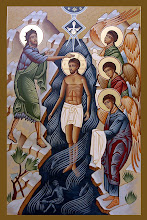Review of 3 Views on Eastern Orthodoxy and Evangelicalism
This was posted by me at Amazon.com on "Eastern Orthodoxy and Evangelicalism: 3 Views" published by Zondervan.
This book gets four stars because of both the great idea of comparing the two Christian traditions and Bradley Nassif. The other authors were very unprepared for the book. Michael Horton does the best job of the evangelicals but still gets some aspects of Orthodox theology wrong. Vladimir Berzonsky was the worst writer by far because he equated all evangelicals with Anabaptists in their theological views (particularly with the Sacraments). This is not his fault though, because the book itself does a horrible job explaining what evangelicalism is.
The two evangelicals are (I think) Baptist and Presbyterian (or Reformed), but there are huge differences in these traditions, and I am truly shocked that none of the writers were Confessional Lutherans even thought the historical meeting between the Patriarch of Constantinople and the Lutheran scholars of Tubingen is brought up in nearly every chapter. This means no writer defends the view of Lutherans that the bread and wine in the Sacrament of the Lord's Supper have the real presence in them after they are blessed (with the exception of Dr. Nassif who also understands that the term usually applied for this which is Consubstantiation is a very poor term nearly no competant Lutheran and/or Episcopal scholar uses)!
Nassif also used the best methodology in his analysis of doctrine (that of Christological Maximalism) thus showing many views, particularly of the Sacraments (if I may dare call them that) in the evangelical churches were argued over in the past by councils who found such views contrary to the doctrine of the Trinity and the Incarnation which all branches of non-heretical Christianity accept.
My review should not be seen as a praise of just the Orthodox. Nassif happens to be an Orthodox writer who was at one time an evangelical and it shows in the quality of his presentation (even though I would say he should have made his position a maybe). The worst writer, Berzonsky both commits the aforementioned oversimplification but he also made it seem as if all the differences between the two were the lack of tradition (which in some ways I agree with), but also the denial of the council in which the iconodules won over the iconoclasts, which not all evangelicals would disagree with (i.e., not all evangelicals are iconoclasts.....i.e. me).
Overall I think that the book should have been much longer and should have been much more thought out by the last four writers. Nassif gets the gold medal....everyone else needs to repeat Seminary, or really read and try to understand either "The Orthodox Church" by Bishop Kalistos Ware (and the Philokalia for the mystically minded) or Calvin's "Institutes of the Christian Religion" (and Luther's Large Catechism and the Book of Concord).
This book is worth it for the first chapter. The responses are just kissing up to each other....usually :-).
This book gets four stars because of both the great idea of comparing the two Christian traditions and Bradley Nassif. The other authors were very unprepared for the book. Michael Horton does the best job of the evangelicals but still gets some aspects of Orthodox theology wrong. Vladimir Berzonsky was the worst writer by far because he equated all evangelicals with Anabaptists in their theological views (particularly with the Sacraments). This is not his fault though, because the book itself does a horrible job explaining what evangelicalism is.
The two evangelicals are (I think) Baptist and Presbyterian (or Reformed), but there are huge differences in these traditions, and I am truly shocked that none of the writers were Confessional Lutherans even thought the historical meeting between the Patriarch of Constantinople and the Lutheran scholars of Tubingen is brought up in nearly every chapter. This means no writer defends the view of Lutherans that the bread and wine in the Sacrament of the Lord's Supper have the real presence in them after they are blessed (with the exception of Dr. Nassif who also understands that the term usually applied for this which is Consubstantiation is a very poor term nearly no competant Lutheran and/or Episcopal scholar uses)!
Nassif also used the best methodology in his analysis of doctrine (that of Christological Maximalism) thus showing many views, particularly of the Sacraments (if I may dare call them that) in the evangelical churches were argued over in the past by councils who found such views contrary to the doctrine of the Trinity and the Incarnation which all branches of non-heretical Christianity accept.
My review should not be seen as a praise of just the Orthodox. Nassif happens to be an Orthodox writer who was at one time an evangelical and it shows in the quality of his presentation (even though I would say he should have made his position a maybe). The worst writer, Berzonsky both commits the aforementioned oversimplification but he also made it seem as if all the differences between the two were the lack of tradition (which in some ways I agree with), but also the denial of the council in which the iconodules won over the iconoclasts, which not all evangelicals would disagree with (i.e., not all evangelicals are iconoclasts.....i.e. me).
Overall I think that the book should have been much longer and should have been much more thought out by the last four writers. Nassif gets the gold medal....everyone else needs to repeat Seminary, or really read and try to understand either "The Orthodox Church" by Bishop Kalistos Ware (and the Philokalia for the mystically minded) or Calvin's "Institutes of the Christian Religion" (and Luther's Large Catechism and the Book of Concord).
This book is worth it for the first chapter. The responses are just kissing up to each other....usually :-).

